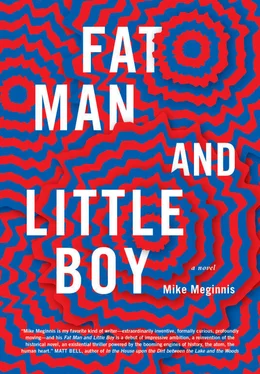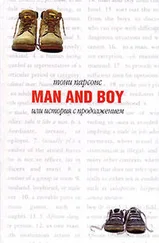Masumi never flew again. Before he got the chance, there was a raid on his base. American planes strafed their hangars, destroying everything. Many died.
After Hiroshima, after Nagasaki, after the surrender, after the emperor’s voice went out over the radio announcing the surrender, Masumi was allowed to go home to his family. He found his father drinking sake, staring at the wall. His mother read poetry in bed.
She said she was glad Masumi was home.
She said she had missed him while he was at school.
She said, “Hideki is dead.”
The army had sent them a box a month before. Inside the box was a bag of money, a notice of Hideki’s posthumous promotion, and a written description of his death. There was also another box, smaller, wooden.
“I can’t look inside the smaller box,” said his mother.
“How did he die?” asked Masumi.
“Your father has the letter.”
Masumi asked again how Hideki died.
“He was piloting one of those baby submarines,” said his mother. “Apparently it was a test run. They put it in the water. It never came back up. They say it sank very quickly. They say he must have drowned or, if he was lucky, simply run out of air, passing out before the water breached.”
Imagine your brother in a submarine. He cannot move his arms or legs. He sees through a sort of bubble on top of the tube. He is sinking deep into the blue until the blue becomes black. His lungs fill with water or they empty of air. He cannot feel his limbs. He only sees the blue so blue it’s black, and then the insides of his eyelids, and then the black. Wonder how and when he knew he was dead, that he had really crossed the threshold, that he was done. Wonder if he ever knew.
“We got more money because he died the way he did, because they promoted him,” said Masumi’s mother. It would have been the same for Masumi. He would have been promoted too. “Your father took the money and bought sake. He hasn’t gone to work. Yesterday someone came to check on him. Your father threw a bottle at his head.”
Masumi went and sat with his father. After a long time, his father seemed to notice him. “You’re home.”
“I am.”
“Hideki is dead.”
“I know.”
“He was my favorite.”
“I know that too.”
His father fell asleep drinking sake.
The next day Masumi found the small wooden box.
He reached to open it and see what was inside.
His skin touched the soft, almost-smooth grain of the wood.
He had a vision.
He saw their grandfather as if he was alive again. He saw his grandfather’s father, and his wife, and her sister. He saw all the dead.
Masumi never opened the box.
Soon he ran away from home.
It’s different for women. There is no shame in survival. No one wanted you dead in the first place. You don’t have to think of your brother. If you do, a small drink helps, or sometimes a big one. You can be pretty. You can wear a nice robe.
I’m sorry you found me out there under the tree.
The medium puts the gun on the table and pours himself another drink. He says, “You can still kill me if you want to. That was my other plan, if I didn’t kill you. Maybe shoot me in the back of the head.”
Fat Man says, “I wouldn’t do that, Masumi. I’m guilty of much worse.”
“Pour me another drink while I down this one.” He takes what he’s got in a swallow while Fat Man obliges him with another. He wipes his mouth with his sleeve. Hisses like a happy snake. Hisses for the sting. He downs the second glass.
Fat Man pours him another. “Easy there. I only know the one hangover cure.” He indicates the gun.
Little Boy says, “So you’re your own husband?”
Fat Man elbows him to be quiet.
“He was me, yes,” says the medium, in his man’s voice, “and I was him,” in his woman’s.
Little Boy mulls it over. “You never opened the box?”
Masumi shakes his head.
“So you don’t know what’s inside?”
“No, I don’t.”
“Are you ever going to open the box?” says Little Boy.
“No.”
“So you’ll never know what’s inside it, even though your life revolves around it entirely now,” says Little Boy.
“That’s right.”
Little Boy takes the box.
“Wait!” shouts Masumi.
“No!” shouts Fat Man.
They both go for the gun. Fat Man gets it first. He gestures with the business end.
“Put it down,” says Masumi.
“I’m doing you a favor.” Little Boy shakes the box. There is no rattle inside. Perhaps a flutter. “Sounds empty to me.”
Masumi advances on Little Boy, making his hands talons. “You slow, stupid, dull-witted boy.”
Little Boy turns his back on them. He squats, setting the box on the ground, shielding it from their view with his hunched body. He opens the box. The sound of a machine’s parts falling into place. The sound of a pendulum at its lowest point. The sound of a box being opened.
Masumi groans—grabs Little Boy by his hair and his ear. As he’s dragged away, Little Boy says, “I don’t understand.”
Fat Man peers into the box while the medium screws his eyes shut and thrashes the boy.
Inside there is a small piece of white paper, curled inward on itself like a lock of hair.
“Stop, Masumi,” says Fat Man. “It’s too late. He’s already done it.”
Masumi lets the boy go and approaches the box. He sets it on the table, knocking over several bottles, which pour out on the floor, dook dook dook.
Masumi takes the curl of paper from the box. “I wish I never saw this.”
Two Japanese characters, stacked in a squat column.
Little Boy gets up and goes around to see it over his shoulder. Fat Man, slipping the gun into his pocket, does the same.
“What does it say?” asks Fat Man.
The medium closes his eyes. He waits until the air inside him feels like it’s enough.
“The first character means leave behind. It almost always refers to death. The second character is bone. Together in this way, it means remains.”
“Remains,” echoes Fat Man. “Like a body?”
Masumi nods.
Little Boy is crying. “They look like brothers.”
遺
骨
A week later Fat Man and Little Boy find the tree like a willow destroyed. The tree is collapsed into a heap of large charcoal segments, recognizable as former limbs, as quarters of the trunk, and knots. The tree will issue ash for days. The fire chars the grass around the roots but does not spread. Masumi is there, dressed as a man, though his long hair is let down, hanging in wild black streams over his face and pushed behind his ears under the white rim of his hat. As they approach, he gestures at what he’s done and jumps on the pile, stomping with both feet, kicking up wild flurries of black powder. It looks as if he’s crushing grapes for wine. The ground is littered with bottle necks and bottle ends, which refract and flare the light at many points, sharp ugly scatter shine.
“You’ve blinded me,” he screams, blowing his hair out of his face. “You’ve taken my second sight.” He indicates his eyes with fingers one and two, then jabs himself in the forehead where the third eye would go. “How am I to see my brother now?”
He says, “You never should have opened my brother’s box!”
He says, “I’ll kill you!”
But Fat Man has the gun.
He describes for them the joy of burning down their tree. He poured his alcohol on her, threw bottles up against her until they broke and stained the bark, until the air was thick with it, and his eyes, ears, and nostrils stung, so that he was drunk on the air, and he felt its bitter tingle on his skin. The air was drunk on him, he boasts. He soaked a rag in alcohol. He fed the rag to his last lovely brown bottle of bourbon. He lit the rag and threw it at their tree.
Читать дальше












